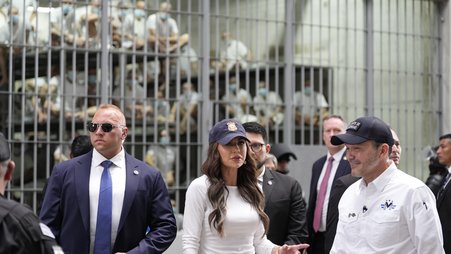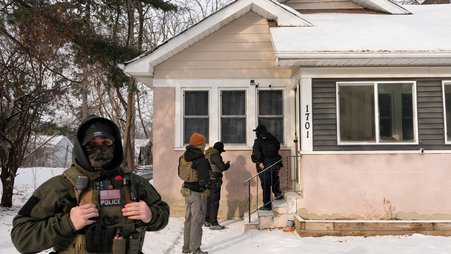Tuesday marked the second day of the court martial of Bradley Manning, the Army intelligence analyst facing decades in prison for leaking over 700,000 government documents to the whistleblower website WikiLeaks. The morning saw the prosecution launch into the meat of their argument by calling numerous forensic experts as well as Adrian Lamo, the grey hat hacker who turned Manning over to law enforcement.
While the prosecution spent the morning working to remove any shadow of doubt that Manning transferred documents to WikiLeaks, the defense focused entirely on motivation: painting Manning as an idealistic young man driven to make the world a better place. For every witness that the prosecution called, the defense sought to establish whether there was any evidence that Manning was motivated to help the enemy or hurt the United States. In every case, witnesses could not point to evidence Manning had been motivated by an urge to help the enemy.
You can read the entire morning's testimony, transcribed by our crowd-funded professional stenographers, here.
Much of the testimony that was submitted in the court martial today was familiar to those who have been following the case: a series of forensic experts testified (or written testimony read aloud by the prosecution) explained the handling, imaging, and early forensic examinations of computers Manning used during his time in the military. The defense showed little enthusiasm for examining most of these forensic experts, speaking up several times to tell that judge that the defense would stipulate the expertise of the witnesses in order to skip over the lengthy review of each witnesses’ credentials.
In the cross-examination of forensic expert Mark Johnson, the defense specifically asked if evidence had been found to indicate Manning hated the United States, sympathized with terrorists, or had received an inexplicable influx of money. Johnson noted that he’d thoroughly examined two of the computers Manning used and found no evidence of any of that.
The morning included the testimony of Adrian Lamo, who himself faced the possibility of years in prison when he hacked several major websites in his early 20s. Lamo spoke about Manning’s state of mind, as he understood it, during the five or six days they communicated via chat. He noted that Manning had been in need of emotional and moral support. He described Manning as desperate and isolated, perhaps suicidal, with no one he could talk to. He related how Manning had apologized several times in those conversations for pouring his heart out to someone who was basically a stranger. Lamo even admitted that one of the reasons he had originally contacted authorities was concern about Manning.
Under questioning by defense attorney David Coombs, Lamo haltingly explained that Manning had appeared to him in chat to be an intensely troubled young man motivated by idealistic values. He noted Manning’s humanist values, which prized human life, and that Manning placed great value in his role in safeguarding the lives of his fellow soldiers and civilians in the conflict zones.
The defense’s focus on motivation is likely due to the expansive and vague “aiding the enemy” charge that Manning is facing. This military law stipulates “any person who aids, or attempts to aid, the enemy with arms, ammunition, supplies, money, or other things…shall suffer death or such other punishment as a court-martial or military commission may direct.”
Many experts have denounced the ‘aiding the enemy’ charge as incredibly broad and dangerous to future whistleblowers as applied in this case, no matter what one thinks of Manning’s leak. A conviction would equate intentionally handing information to al-Qaeda with the knowledge they would use it to damage the US and posting truthful information online for public consumption.
ACLU’s Ben Wizner said if Manning is convicted, “the threat of criminal prosecution [would hang] over any service member who gives an interview to a reporter, writes a letter to the editor, or posts a blog to the internet.” Harvard Law Professor Yochai Benkler called it, “a clear and present danger to journalism in the national security arena.”
Remember, Manning has already submitted a “naked” plea – taking responsibility for disclosing data to WikiLeaks without getting any plea-bargain agreement in return – and faces up to twenty years in jail no matter what happens in this trial. If found guilty of the ‘aiding the enemy’ charge, Manning could face life without parole.
This morning’s interrogation of Adrian Lamo ended when he was asked if at any point Manning had said that he had no loyalty to America, or if the American flag meant nothing to him. Lamo admitted that Manning had never said anything like that. Lamo, the man responsible for Manning’s arrest, made clear Manning never told him he wanted to help the enemy.




